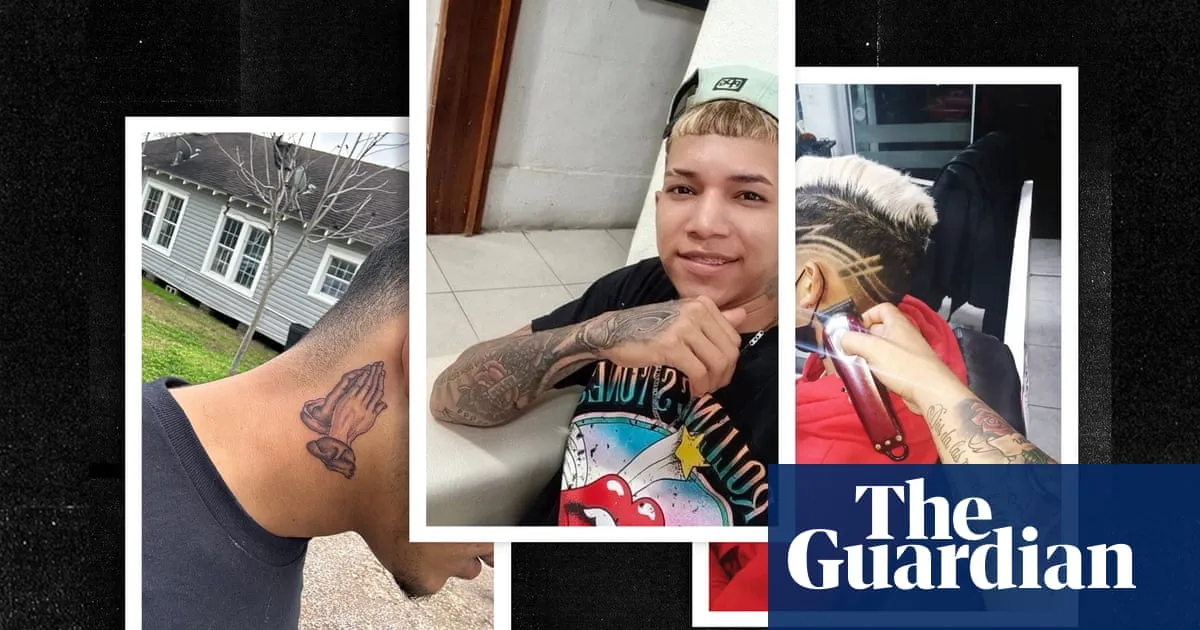
Franco José Caraballo Tiapa, a 26-year-old Venezuelan, embodies a growing trend among his peers: a passion for body art. With tattoos adorning his body, including a rose, a lion, and a razor blade that symbolizes his profession as a barber, Caraballo’s tattoos tell a story of personal significance. On his left side, his tattoo of a pocket watch marks the birth of his eldest daughter, Shalome, while another tattoo displays her name in bold lettering across his chest.
“He’s just a normal kid … he likes tattoos – that’s it,” said Martin Rosenow, a Florida-based attorney representing Caraballo. His story took a troubling turn when he was detained by U.S. immigration officials in Dallas last month. They mistakenly interpreted his tattoos as evidence of his affiliation with Venezuela’s notorious gang, Tren de Aragua. A Department of Homeland Security document reviewed by the Guardian labeled Caraballo as a “Member/Active of Tren de Aragua,” yet failed to provide any substantial evidence for this allegation.
Rosenow vehemently disputes the notion that Caraballo's tattoos signify gang membership. “It’s specious – there’s no basis for this conclusion,” he stated, emphasizing that experts familiar with the Venezuelan gang culture have confirmed that there are no specific tattoos associated with gang members like Tren de Aragua. “If you see pictures of actual Tren de Aragua members arrested in the U.S., many of them don’t even have tattoos,” he further explained.
Caraballo’s journey began in the state of Bolívar, Venezuela, where he entered the U.S. through its southern border in October 2023. Like many of his fellow countrymen, he sought refuge from the dire economic conditions and political unrest in Venezuela. Unfortunately, U.S. immigration officials have seemingly categorized several Venezuelans as gang members based solely on their nationality and body art.
Daniel Alberto Lozano Camargo, a 20-year-old asylum seeker from Maracaibo, also faced a similar fate. Living in Houston, Texas, he worked washing cars. However, his life took a drastic turn when he was arrested after a supposed client contacted him. His partner, Leslie Aranda, reported that he has numerous tattoos, including the names of family members and a rose. “He doesn’t belong to any gang,” Aranda asserted, emphasizing the injustice of his detention.
Neri José Alvarado Borges, another Venezuelan deported to El Salvador, had tattoos that family members believe led to his wrongful identification as a criminal. His sister, Lisbengerth Montilla, stated, “None of these tattoos has anything at all to do with the Tren de Aragua.” Alvarado, a psychology student, was forced to abandon his studies and migrate due to Venezuela’s economic collapse.
Similarly, Luis Carlos José Marcano Silva, a barber from Margarita, Venezuela, was detained during an immigration hearing in Miami last month. His tattoos, which include religious symbols and personal tributes to his daughter, were also misinterpreted as gang affiliations. His mother described the distress she felt at her son’s unjust treatment, highlighting the emotional toll of these allegations.
Jerce Reyes Barrios, a former professional footballer, experienced a similar ordeal. His tattoos, including a crown over a soccer ball, were misidentified by immigration officials as gang insignia. Reyes fled Venezuela after facing torture for participating in anti-government protests. His attorney, Linette Tobin, emphasized that Reyes’s tattoos were personal choices rather than indicators of criminal behavior.
Francisco Javier García Casique is another Venezuelan deported under similar circumstances. His tattoos, which symbolize family and personal milestones, were also misconstrued as gang-related. His brother, Sebastián, expressed outrage at the false accusations, insisting that their family is hardworking and decent, contrary to the portrayal by U.S. authorities.
The situation facing these Venezuelan asylum seekers raises serious questions about the treatment of immigrants in the U.S. The White House has labeled those deported to El Salvador as “heinous monsters,” but many have no criminal records to justify such claims. U.S. immigration officials have acknowledged that many of those removed under the Alien Enemy Act lacked criminal histories, yet they remain steadfast in their assertions of gang affiliations.
As these individuals face deportation, it is crucial to advocate for their rights and recognize the humanitarian crises forcing people like Caraballo, Lozano, Alvarado, Marcano, Reyes, and García to flee their homeland. The misidentification of individuals based on tattoos and nationality not only undermines their personal stories but also raises significant human rights concerns that demand immediate attention.